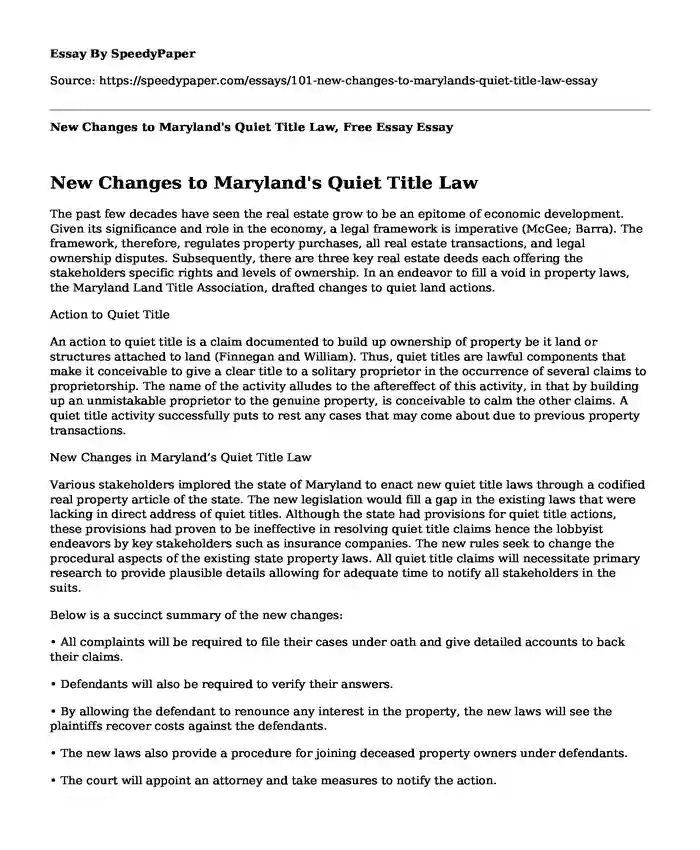
| Type of paper: | Essay |
| Categories: | Law Government |
| Pages: | 3 |
| Wordcount: | 639 words |
New Changes to Maryland's Quiet Title Law
The past few decades have seen the real estate grow to be an epitome of economic development. Given its significance and role in the economy, a legal framework is imperative (McGee; Barra). The framework, therefore, regulates property purchases, all real estate transactions, and legal ownership disputes. Subsequently, there are three key real estate deeds each offering the stakeholders specific rights and levels of ownership. In an endeavor to fill a void in property laws, the Maryland Land Title Association, drafted changes to quiet land actions.
Action to Quiet Title
An action to quiet title is a claim documented to build up ownership of property be it land or structures attached to land (Finnegan and William). Thus, quiet titles are lawful components that make it conceivable to give a clear title to a solitary proprietor in the occurrence of several claims to proprietorship. The name of the activity alludes to the aftereffect of this activity, in that by building up an unmistakable proprietor to the genuine property, is conceivable to calm the other claims. A quiet title activity successfully puts to rest any cases that may come about due to previous property transactions.
New Changes in Maryland’s Quiet Title Law
Various stakeholders implored the state of Maryland to enact new quiet title laws through a codified real property article of the state. The new legislation would fill a gap in the existing laws that were lacking in direct address of quiet titles. Although the state had provisions for quiet title actions, these provisions had proven to be ineffective in resolving quiet title claims hence the lobbyist endeavors by key stakeholders such as insurance companies. The new rules seek to change the procedural aspects of the existing state property laws. All quiet title claims will necessitate primary research to provide plausible details allowing for adequate time to notify all stakeholders in the suits.
Below is a succinct summary of the new changes:
• All complaints will be required to file their cases under oath and give detailed accounts to back their claims.
• Defendants will also be required to verify their answers.
• By allowing the defendant to renounce any interest in the property, the new laws will see the plaintiffs recover costs against the defendants.
• The new laws also provide a procedure for joining deceased property owners under defendants.
• The court will appoint an attorney and take measures to notify the action.
• To quiet the title to real property; the new laws outline an enforceability provision and a record of judgments.
Comparison and Accomplishments of the New Laws
Comparison between the new legislation and the preceding provisions depict that the changes were not aimed at changing Maryland law or effect a complete overhaul. The bill was enacted to codify the current laws governing the quiet title actions in the state. Among the key voids and problems that the new laws are set to solve is the lack of a comprehensive process. The state of Maryland did not have a clearly defined methodological framework to calm quiet title actions. Following the uncertainties caused by the gap, some insurance companies had opted out. Improving on the customary state laws, the new laws provide a succinct framework that encompasses clearly defined procedures of quiet title judgments. The new changes also shield property purchasers through protection from uncertain defects in the title as well as value protection from collateral on the ruling.
Works Cited
Barra, Mauricio Leon de la. "Investing in Mexican Real Estate: Outlook, Legal Framework, and Special Considerations." California Real Property Journal (2008): 8-10. Print.
Finnegan and F. William. "Problems and Procedure in Quiet Title Actions." Nebraska Law Review (1946): 485. Print.
McGee, Dawn K. "Potential Liability for Misrepresentations in Residential Real Estate Transactions: Let the Broker Beware." Fordham Urban Law Journal (1987): 127-170. Print.
Cite this page
New Changes to Maryland's Quiet Title Law, Free Essay. (2018, Aug 10). Retrieved from https://speedypaper.net/essays/101-new-changes-to-marylands-quiet-title-law-essay
Request Removal
If you are the original author of this essay and no longer wish to have it published on the SpeedyPaper website, please click below to request its removal:
- Free Essay on Racial Inequalities in Modern Societies
- Management Essay Sample: Description of the Apple Inc. Company
- Physician Assisted Suicide Should be Legalized - Free Essay on Euthanasia
- Movie Review Essay Example on How the Beatles Changed the World
- Essay Sample on Human Rights Watch's Policy of Ensuring the ICC's Impartiality
- Free Essay Example: Superstition Presentation
- Essay Example: Physiology for Psychologists
Popular categories




